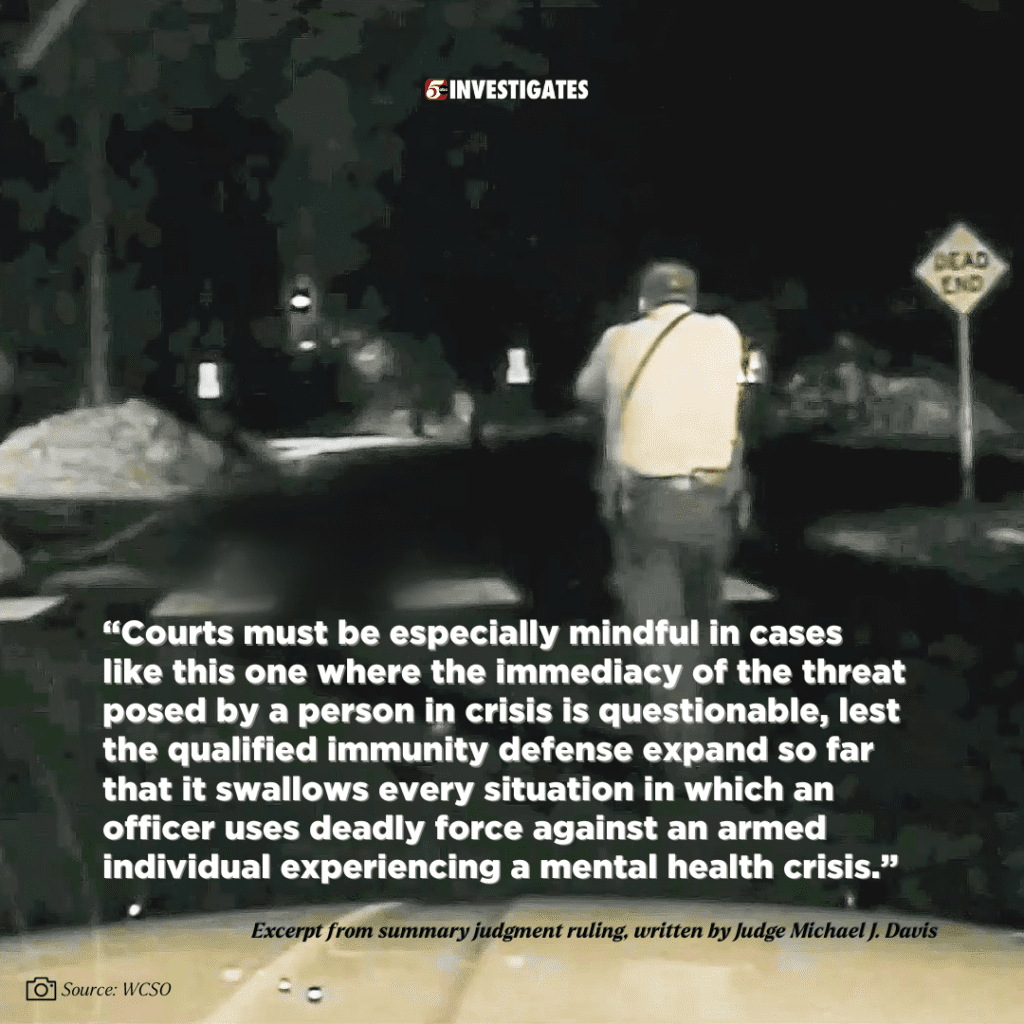Police officers are often protected by qualified immunity. A deadly shooting in Minnesota is now testing those limits.
A wrongful death lawsuit against a Washington County sheriff’s deputy will be closely watched by legal experts, civil rights advocates, and law enforcement across the state after a federal judge ruled the officer may not be shielded from civil liability.
This summer, Judge Michael Davis allowed a lawsuit against Deputy Brian Krook to move forward.
In the 70-page order, Davis also ruled the deputy may not be protected by qualified immunity — a long-established legal precedent that often protects officers who use deadly force.
The case raises new questions about when officers can be held liable for using deadly force against individuals experiencing a mental health crisis.

In 2018, Deputy Brian Krook shot and killed Benjamin Evans. The 23-year-old was armed with a handgun and threatening to kill himself when deputies found him kneeling in a Lake Elmo intersection.
A grand jury indicted Krook on manslaughter charges. The case went to trial, and a jury found him not guilty in March 2020.
Later that year, Evans’ family filed a civil rights lawsuit, claiming Krook’s use of deadly force against Evans, who was in the midst of a mental health crisis, was unconstitutional.
“I grew up with my parents telling me, ‘If you’re ever in trouble, go find a policeman,'” said Bill Evans, Benjamin’s father, during a recent interview. “‘You go to them, and they will help you.’ And I’m not really sure I totally believe that anymore.”
The shooting
Washington County sheriff’s deputies responded to the 911 call just after midnight on April 12, 2018.
Evans, who worked as an EMT and volunteer firefighter, was suicidal, holding a gun to his head when law enforcement arrived on scene.
Body camera and squad camera video recently obtained by 5 INVESTIGATES show that for nearly 40 minutes that night, multiple sheriff’s deputies negotiated with Evans, trying to get him to put the gun down.
“We honestly don’t want you to hurt yourself, Benjamin,” a deputy is heard saying. “You’re a firefighter. You’re a fellow first responder, man. We gotta back each other up.”
Evans repeatedly stated he didn’t want to hurt anyone but himself. At one point, deputies noted he unloaded the magazine from the gun.
“Are you able to take whatever’s in the chamber out as well?” one asked.
“It’s for me, not you,” Evans responded.
When Deputy Krook arrived on scene, he told fellow officers he was prepared to use less lethal rounds on Evans. But just before 1 a.m., without warning and while Evans was still talking to negotiators, Krook fired four rounds from his handgun.
Evans later died at the hospital.
“It was a moment when your heart not only breaks, it explodes,” said Bill Evans, who learned of his son’s death the following morning. “Everything means nothing now, except for the fact you just lost a child.”
Questioning qualified immunity
Deputy Krook, who declined an interview request from 5 INVESTIGATES, is appealing the judge’s decision. His attorneys argue he is entitled to qualified immunity, a long-standing legal defense that often shields law enforcement from civil liability.
But in his summary judgment ruling, Judge Davis questioned whether the qualified immunity defense expands “so far that it swallows every situation in which an officer uses deadly force against an armed individual experiencing a mental health crisis.”
Legal experts say Davis’ ruling tests the limits of the controversial protection.
Gregory Sisk is a law professor at the University of St. Thomas. He said the ruling could set the stage for stronger cases for people who sue law enforcement.
“In future cases, law enforcement will be under even further clear notice that you may not use deadly force against a suicidal individual, even though they are in possession of and threatening to use a firearm against themselves,” Sisk said in an interview.
Civil rights attorney Kenneth Udoibok agrees.
“When the victim is not posing a threat to anyone, you must not kill,” he said. “And if you do, it will be consequential.”
But Richard Hodsdon, the attorney for the Minnesota Sheriffs’ Association, said the case will have more of a chilling effect than a legal one.
“Law enforcement across this country — and I know this because I teach nationally — is having huge difficulties attracting qualified competent candidates into the profession,” he said. “[Officers] do not want the civil and criminal liability exposure that’s associated with being a police officer anymore.”
Like many police officers, Benjamin Evans felt called to serve his community and decided to follow in his father’s footsteps.
Bill Evans worked as a paramedic firefighter for 36 years. In that time, he responded to hundreds of calls involving individuals in crisis.
“Any time that we would go on a call like that, if you were in crisis, then you deserved help,” he said. “The objective was to get them out of there and get them some help and make sure that they were safe. And … that opportunity was not given.”
If you or a loved one is experiencing a mental health crisis or thoughts of suicide, help is available 24/7 through the Suicide and Crisis Lifeline by calling or texting 988.